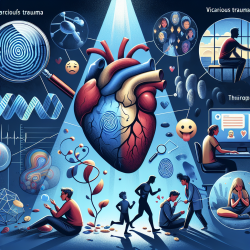Understanding Vicarious Trauma in Forensic Science Practitioners
In the realm of forensic science, practitioners are often exposed to traumatic materials, which can lead to vicarious trauma (VT). The literature review titled "Trauma and coping mechanisms exhibited by forensic science practitioners" highlights the prevalence of VT among these professionals and suggests coping strategies to mitigate its effects. This blog aims to distill key insights from the research to help forensic practitioners enhance their skills and encourage further exploration of this critical topic.
The Impact of Vicarious Trauma
Forensic science practitioners, including crime scene investigators, digital forensic examiners, and medical examiners, are frequently exposed to graphic content and traumatic events. This exposure can lead to VT, characterized by negative changes in cognitive schemas and worldviews. Unlike secondary traumatic stress (STS), which mimics PTSD, VT is a cumulative and permanent alteration in perception, affecting one's sense of safety, trust, and control.
Research Findings and Implications
The literature review highlights several key findings:
- Forensic practitioners often exhibit symptoms of VT and STS due to prolonged exposure to traumatic materials.
- Burnout is prevalent among those working in forensic disciplines, exacerbated by shift work and high-stress environments.
- Personality traits, such as neuroticism, can influence susceptibility to VT.
These findings underscore the need for targeted interventions and organizational support to mitigate the effects of trauma on forensic practitioners.
Coping Mechanisms and Interventions
To combat VT and related stressors, the research suggests several coping strategies:
- Social Support: Building strong support networks within the workplace can provide emotional relief and reduce feelings of isolation.
- Mindfulness and Self-Care: Engaging in mindfulness practices and self-care routines can enhance resilience and improve decision-making.
- Humor: Utilizing humor, particularly light-hearted humor, can serve as an effective coping mechanism to alleviate stress.
- Professional Debriefing: Structured debriefing sessions with peers can facilitate the processing of traumatic experiences.
Implementing these strategies can help forensic practitioners maintain their well-being and continue to perform their roles effectively.
Encouraging Further Research
While the literature provides valuable insights, there is a need for further research to explore VT in forensic science practitioners comprehensively. Future studies should aim to develop standardized measures for assessing VT and evaluate the effectiveness of various interventions.
For forensic practitioners, understanding and addressing VT is crucial for maintaining professional efficacy and personal well-being. By implementing evidence-based coping mechanisms and advocating for organizational support, practitioners can better manage the challenges associated with their work.
To read the original research paper, please follow this link: Trauma and coping mechanisms exhibited by forensic science practitioners: A literature review.










